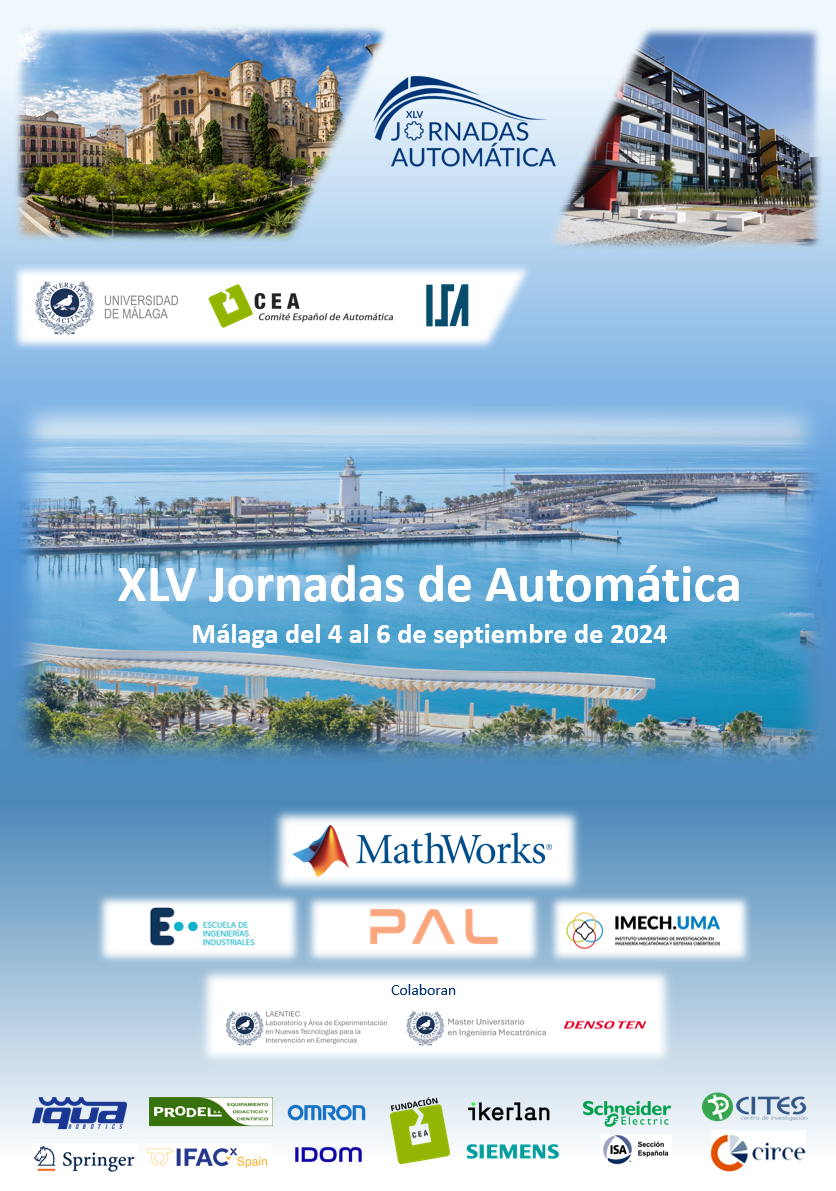Energy Management System for a Hybrid Fuel Cell Unmanned Aerial Vehicle
Sistema de gestión de energía para aeronaves híbridas con pila de combustible
DOI:
https://doi.org/10.17979/ja-cea.2024.45.10827Palabras clave:
Optimal control of hybrid systems, Aerospace, UAVs, Modeling and simulation of power systems, Neural and fuzzy adaptive control, Data-based controlResumen
This paper presents the design, implementation, and experimental validation of the energy management system for a hybrid fuel cell and battery powertrain system for unmanned aerial vehicles (UAVS). The integration of fuel cells and batteries in UAV powertrains combines the high specific energy of fuel cells with the high specific power of batteries, resulting in a more efficient and lightweight energy solution. A novel energy management system (EMS), featuring advanced control algorithms such as fuzzy logic, is proposed to optimize energy distribution and enhance overall performance. The experimental setup includes a test-bench design equipped with a programmable DC/DC converter and a digital twin for real-time monitoring and predictive energy management system. Simulation and experimental results demonstrate significant improvements in energy efficiency, reduced emissions, and enhanced operational reliability. This study underscores the potential of hybrid powertrain systems in advancing the sustainability and efficiency of UAV operations.
Referencias
Airbus, 2022. Towards the world’s first hydrogen-powered commercial aircraft. URL: https://www.airbus.com/en/innovation/zero-emission/hydrogen/zeroe
Baroutaji, A., Wilberforce, T., Ramadan, M., Olabi, A. G., 2019. Comprehensive investigation on hydrogen and fuel cell technology in the aviation and aerospace sectors. Renewable and sustainable energy reviews 106, 31–40.
Basner, M., Clark, C., Hansell, A., Hileman, J. I., Janssen, S., Shepherd, K., Sparrow, V., 2017. Aviation noise impacts: state of the science. Noise and Health 19 (87), 41–50.
Brandon, N. P., Kurban, Z., 2017. Clean energy and the hydrogen economy. Philosophical Transactions of the Royal Society A: Mathematical, Physical and Engineering Sciences 375 (2098), 20160400.
de Frutos, V. M., Parra, J. R., Esteban, S., Bordons, C., 2023. Analysis of hybrization for the use of hydrogen for aircraft propulsion in an existing platform. In: AIAA AVIATION 2023 Forum. p. 3876.
Gao, L., Jiang, Z., Dougal, R. A., 2005. Evaluation of active hybrid fuel cell/battery power sources. IEEE Transactions on Aerospace and Electronic Systems 41 (1), 346–355.
Ham, B., 2021. Creating “digital twins” at scale. URL: https://aeroastro.mit.edu/news-impact/ creating-digital-twins-at-scale/
Herwerth, C., Chiang, C., Ko, A., Matsuyama, S., Choi, S. B., Mirmirani, M., Gamble, D., Paul, R., Sanchez, V., Arena, A., et al., 2007. Development of a small long endurance hybrid pem fuel cell powered uav. SAE Technical Paper. DOI: https://doi.org/10.4271/2007-01-3930
Hydrogen, U., 2024. Fueling carbon-free flight. URL: https://hydrogen.aero/
Lee, D. S., Fahey, D. W., Skowron, A., Allen, M. R., Burkhardt, U., Chen, Q., Doherty, S. J., Freeman, S., Forster, P. M., Fuglestvedt, J., et al., 2021. The contribution of global aviation to anthropogenic climate forcing for 2000 to 2018. Atmospheric environment 244, 117834.
Lee, J., Davari, H., Singh, J., Pandhare, V., 2018. Industrial artificial intelligence for industry 4.0-based manufacturing systems. Manufacturing letters 18, 20–23.
Negri, E., Fumagalli, L., Macchi, M., 2017. A review of the roles of digital twin in cps-based production systems. Procedia manufacturing 11, 939– 948.
of Sciences, N. A., on Engineering, D., Sciences, P., Aeronautics, Board, S. E., on Propulsion, C., to Reduce Commercial Aviation Carbon Emissions, E. S. (Eds.), 2016. Commercial aircraft propulsion and energy systems research: reducing global carbon emissions. National Academies Press.
Rasheed, A., San, O., Kvamsdal, T., 2020. Digital twin: Values, challenges and enablers from a modeling perspective. IEEE access 8, 21980–22012.
Staffell, I., Scamman, D., Abad, A. V., Balcombe, P., Dodds, P. E., Ekins, P., Shah, N., Ward, K. R., 2019. The role of hydrogen and fuel cells in the global energy system. Energy & Environmental Science 12 (2), 463–491.
Tao, F., Zhang, H., Liu, A., Nee, A. Y., 2018. Digital twin in industry: Stateof-the-art. IEEE Transactions on industrial informatics 15 (4), 2405–2415.
Yim, S. H., Lee, G. L., Lee, I. H., Allroggen, F., Ashok, A., Caiazzo, F., Eastham, S. D., Malina, R., Barrett, S. R., 2015. Global, regional and local health impacts of civil aviation emissions. Environmental Research Letters 10 (3), 034001.
Yin, H., Zhou, W., Li, M., Ma, C., Zhao, C., 2016. An adaptive fuzzy logicbased energy management strategy on battery/ultracapacitor hybrid electric vehicles. IEEE Transactions on transportation electrification 2 (3), 300–311.
ZeroAvia, 2024. The clean future of flight. URL: https://zeroavia.com/
Zhu, L., Han, J., Peng, D., Wang, T., Tang, T., Charpentier, J.-F., 2014. Fuzzy logic based energy management strategy for a fuel cell/battery/ultracapacitor hybrid ship. In: 2014 first international conference on green
energy ICGE 2014. IEEE, pp. 107–112
Descargas
Publicado
Número
Sección
Licencia
Derechos de autor 2024 Javier Alejandro Quintana, Carlos Bordons Alba, Sergio Esteban Roncero

Esta obra está bajo una licencia internacional Creative Commons Atribución-NoComercial-CompartirIgual 4.0.





